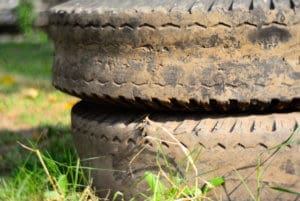Unfortunately, we decided to cancel our JCVCD 2022 Tire Disposal Event due to insufficient staffing. We know this is an important free disposal event for our community to reduce risks associated with storing tires. Still, at this time, we simply lack the resources to manage the program this summer.
How can you be informed of more events like the 2022 tire disposal event?
If you are interested in future opportunities to dispose of tires or receive other valuable information about reducing risks associated with pests and the diseases they carry, sign up for alerts here.
What are the risks associated with storing tires on your property?
Keeping used or worn tires on your property may attract dangerous pests to your yard or neighborhood. One of the most common problems is mosquitoes. Residual standing water inside of tires attracts mosquitoes and creates an optimal location for their larvae.
Mosquitoes are prevalent in most areas in Oregon, and the risk from a bite is much more than just an itchy, red mark. One of the dangerous risks is the transmission of the West Nile virus (WNV). WNW is a potentially serious and sometimes fatal illness first detected in New York in 1999 and spread to Oregon by 2004. The best way to reduce your risk of exposure to diseases spread by mosquito bites is to maintain an environment that doesn’t attract mosquitoes to your yard.
Ways to store tires more safely:
 If you have tires you planned to dispose of, here are some tips you can use to safely store them until another disposal opportunity arises.
If you have tires you planned to dispose of, here are some tips you can use to safely store them until another disposal opportunity arises.
- Store them in a garage, basement, or shed in a dry location.
- Drill holes through the treads so water cannot collect inside the tire.
- Cover the tires with a tarp, but shake out the tarp regularly to prevent water from pooling on it.
- Set the tires on their side and completely fill the inside of the tires with dirt.
You may also www.earth911.com to find other local organizations that accept used tires for recycling purposes. There may be costs associated with disposing of tires at these locations.
Interested in more resources about managing mosquito-related risks this summer?
The Jackson County Vector Control District (JCVCD) is your resource for education and solutions to reduce the risk to you, your family, and your neighbors related to disease-transmitting pests. Vectors are living organisms that can transmit diseases between humans or from other animals to humans. Oregon’s most common vectors include mosquitoes, flies, rats, and ticks.
For example, JCVCD distributes free mosquito fish to Jackson County residents with ‘Aquaria’, tanks or other forms of stagnant water such as unused swimming pools. Mosquito fish feed on mosquito larvae, reducing the population of mosquitoes in your area. Contact JCVCD for more information about getting free mosquito fish or obtaining other educational materials.
